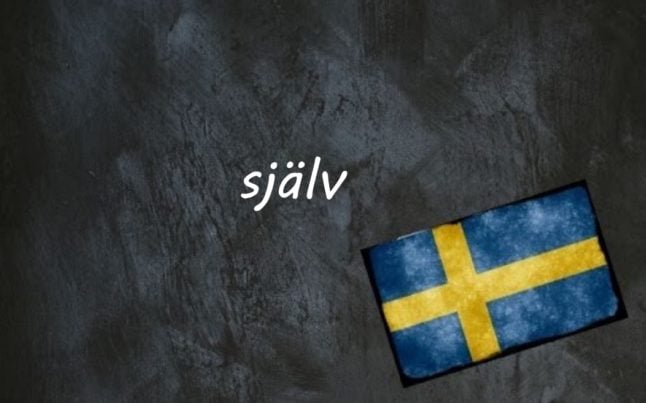Today’s word of the day, födelsedag, is, like the English word “birthday”, a compound word consisting of the word födelse (birth) and dag (day). So far, so simple.
In Sweden, the person whose birthday it is (födelsedagsbarnet or “birthday child” – in southern Sweden they’re often known as a födelsedagsgris or “birthday pig”), will be woken up by the rest of the family, who will sing them a birthday song, after which they will be given their presents, as well as breakfast in bed.
Swedes have a number of different birthday songs, including ja må du leva, vi gratulerar, and the English song Happy Birthday.
Ja må du leva and vi gratulerar are sung to the same tune, and the lyrics are as follows.
Ja må du leva
(Note: swap “du” with the correct pronoun for the whoever you’re singing to)
Ja, må du leva!
Ja, må du leva!
Ja, må du leva uti hundrade år!
Javisst ska du leva!
Javisst ska du leva!
Javisst ska du leva uti hundrade år!
English translation:
Yes, may he live!
Yes, may he live!
Yes, may he live for a hundred years!
Of course he will live!
Of course he will live!
Of course he will live for a hundred years!
You’ll often hear just the first verse sung, but there are a few other verses which you might hear, especially at children’s birthday parties. Here’s one of them:
Och när han har levat!
Och när han har levat!
Och när han har levat uti hundrade år!
Ja, då ska han skjutas!
Ja, då ska han skjutas!
Ja, då ska han skjutas på en skottkärra fram!
English translation:
And when he has lived
And when he has lived
And when he has lived for a hundred years!
Yes, then he will be wheeled
Yes, then he will be wheeled
Yes, then he will be wheeled away in a wheelbarrow!
If this wasn’t weird enough, there are even versions where the the birthday boy or girl is hung upside-down and drowned in champagne, which doesn’t feel like a particularly fun way to celebrate your birthday.
The next birthday song, vi gratulerar, is a slightly more generic version of ja må du leva, which you’re more likely to hear sung for adults or in more professional environments.
Vi gratulerar
Vi gratulerar!
Vi gratulerar!
Vi gratulerar på din födelsedag!
Med blommor och blader!
Vi firar denna dagen
Vi gratulerar på din födelsedag!
And in English:
We congratulate!
We congratulate!
We congratulate you on your birthday!
With flowers and leaves
We celebrate this day
We congratulate you on your birthday!
Birthdays haven’t always been celebrated in Sweden, with name days more popular for much of Swedish history. This is partly due to the fact that many people in rural agricultural societies – particularly pre-1600s – didn’t necessarily know exactly which day they were born on, and partly due to the fact that celebrating a birthday was seen as pagan or heathen in Catholic Sweden, before Lutheranism became more popular.
In the 1600s, churches started keeping records of births, deaths, marriages and christenings in their parishes, although it only became common for normal Swedes to celebrate their birthdays around the end of the 1800s. In some rural areas, children’s birthdays weren’t regularly celebrated until after the second world war.
Nowadays, it’s very unusual for a Swede not to celebrate their birthday, although some religious groups, such as Jehovah’s Witnesses, don’t celebrate birthdays.
Young children will often celebrate at school or at preschool, with their parents organising a födelsedagskalas or födelsedagsfest (birthday party), usually the weekend before or after their birthday.
Celebrating a round number birthday, such as your 30th, 40th or 50th birthday, is sometimes referred to as fylla jämt (literally: “fill evenly”, but essentially “turning a round number”), with a slightly bigger celebration more common. Similarly, turning 18, 25 or reaching pension age is often celebrated with a bigger party.
You’re also likely to see young just-turned-20-year-olds in Sweden’s alcohol monopoly Systembolaget on their birthdays, as the minimum age for buying alcohol in a Systembolaget is 20 (you can buy alcohol in bars and low-alcohol beer in supermarkets at 18).
Those who are lucky enough to actually leva uti hundrade år (live a hundred years) receive a telegram from the King wishing them a happy birthday.
Finally, if you want to wish someone a happy birthday, you can say grattis på födelsedagen!
Example sentences:
Min dotter har födelsedag i dag. Hon fyller tre.
It’s my daughter’s birthday today. She’s turning three.
Vad önskar du dig i födelsedagspresent?
What do you want for your birthday?
Villa, Volvo, Vovve: The Local’s Word Guide to Swedish Life, written by The Local’s journalists, is available to order. Head to lysforlag.com/vvv to read more about it. It is also possible to buy your copy from Amazon US, Amazon UK, Bokus or Adlibris.



 Please whitelist us to continue reading.
Please whitelist us to continue reading.
Member comments